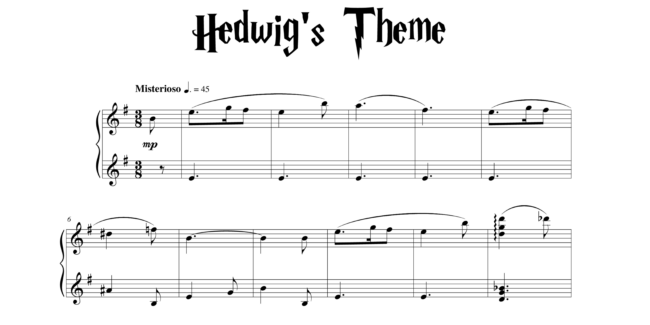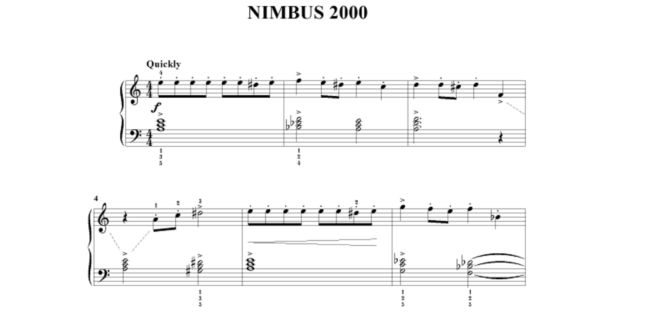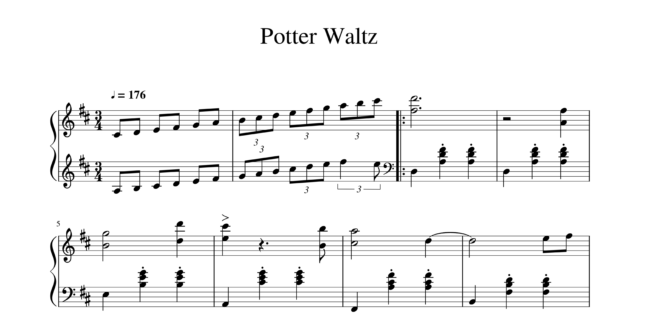Harry Potter Easy Sheet Music for Piano Free

Want to get your witch on? We've broken down some of your favorite musical themes from Harry Potter for beginners.
The Harry Potter feature films are filled with magical music. They're crafted with just the right amount of charm and suspense, drawing you into a world where broomsticks fly, potions make you fall in love, and diaries carry evil spirits.
Musically, the Harry Potter soundtrack is complex, especially for beginners. But with your natural knack for sounds and sorcery, you will surely succeed! Pull out your wand and wander into the wonderful world of wizardry with this guide to Harry Potter sheet music for piano.
- Hedwig's Theme.
- Nimbus 2000.
- Potter Waltz.
Hedwig's Theme.
Here is an excerpt from the sheet music for Hedwig's Theme–one of the most popular musical motifs from the Harry Potter films.

As you can see, this music is in the ⅜ time signature3/8, meaning that there are three eighth notes per bar. It's also in the G major key which includes the following notes: G, A, B, C, D, E, F#.
Before diving into this sheet music, it's essential to practice the fundamentals. Here is an exercise that trains your brain and your wand (I mean, fingers) to play in G major and 3/8:
- Place the metronome on 125bpm in the time signature 3/8.
- Now play the G major scale in time with the metronome–one note per click.
- Once that feels comfortable, change up the pattern. Play three notes in a row, and then go back one note. For example, GAB, ABC, BCD, CDE, and so on.
- When this is sitting well, take the metronome up to 140bpm.
Nimbus 2000.
This is one of the more upbeat and light-hearted themes in the Harry Potter films. To play this theme with the right energy, we have to learn about two musical terms: staccato and accent.
Staccato means 'detached' in Italian. On the piano, this is when you play each note short and sharp, lifting your hand off the keys between each one. In music notation, it gets a small dot above the circle or head of the note. You can see them pictured on all of the notes below:

An accent is when you emphasize a note with volume and intensity. You can see it in the above sheet music with a small arrow symbol above the note head.
We recommend isolating these music techniques before you start to learn the Nimbus 2000 theme. Try the following exercise to practice playing notes staccato and with accents:
- Put the metronome on 100 bpm in a 4/4 time signature. Play a C major scale with your right hand, one note per click.
- Now play it again, this time making the last four notes of the scale staccato. Press lightly, but with presence, on the keys. Lift your hand slightly between each note.
- Now turn the tempo up to 120bpm. Play the whole C major scale staccato.
- Play it again, accenting the first and fifth degrees of the scale. Press a little harder on these notes, and lean into the key more. Make sure the notes before and after are shorter and gentler but still staccato.
- If that feels comfortable, try accenting every second note of the scale. Then, every third note.
Potter Waltz.
There's nothing like a waltz to get your wand waving! This is a classic Harry Potter theme from the fourth movie, famous for its appearance in the ballroom scenes. A waltz is a musical form that is always in a 3/4 time signature and follows a specific pattern.
Looking at the bass clef (lower staff) in the sheet music excerpt below, you can see that the left hand is playing a broken chord, with the root note on the first beat, and two other notes on beats two and three.

This is a simple pattern to practice and an essential one for playing any kind of waltz. Here is an easy exercise for mastering this musical style:
- Let's play in the key of D major because this is the key of the Potter Waltz. We can choose four chords from the D major scale: D major, G major, E minor, and A major.
- Play each chord on its own, in root position (eg: D, F#, A or G, B, D).
- Put your metronome on 100bpm in a 3/4 time signature. Now play the whole chord progression in time, playing each chord three times along with the metronome clicks.
- When this feels comfortable, separate the lowest note of each chord from the upper two. Play the low note on beat one (with your thumb), and the upper two together on beats two and three (with your middle and pinky fingers). For example, the chord D major would look something like this:

- If this feels good, take the tempo up to 120bpm. Then, try it in your left hand.
Don't forget to sing your incantations.
The best way to learn and internalize music is to sing it aloud. Reading notes and understanding musical symbols is essential, but this shouldn't come at the expense of developing our musical ear.
Make sure you listen to the Harry Potter themes you want to learn, practice singing them back, and even sing along while you play. This will make your playing more musical, and more intuitive and help you acquire useful tools so that your Harry Potter experience carries through into other music you want to learn. Don't just make a wish–say a spell!
Find more cinematic sheet music on our Simply Piano app, that practically sits with you at the piano and teaches you to play.
Source: https://www.hellosimply.com/blog/piano-chords/harry-potter-music-for-beginners/
0 Response to "Harry Potter Easy Sheet Music for Piano Free"
Post a Comment